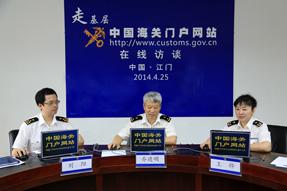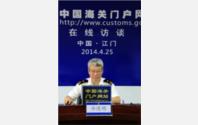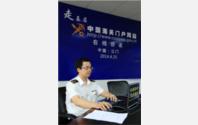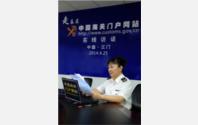 Online Interview
Online Interview
Topic: Strengthening Customs IPR Enforcement to Protect Enterprise Innovation
Time:10:00 AM (Fri) April 25, 2014
Special Guests:Qiao Jinming, Party Leadership Group Member and Deputy Director General of Jiangmen Customs District; Liu Yang, Deputy Director of the Division of Regulations, Guangdong Sub-Administration of the General Administration of Customs
Strengthening Customs IPR Enforcement to Protect Enterprise Innovation
[Liu Yang]: We focused on key fields, key channels and key products with high risk of infringement. For example, in the one-month “China-U.S. IPR Joint Enforcement”, Shenzhen Customs exerted more efforts on cracking down on infringing consumer electronic products to be exported to the U.S. and Hong Kong. Shenzhen Customs took enforcement measures on 941 consignments of infringing goods to be exported to the U.S. and seized nearly 50,000 pieces of infringing goods. 04/25/2014 10:39:11
[Liu Yang]: While combating other illegal activities, Gongbei Customs also inspected the IPR status of the goods. They have investigated and solved 39 major infringement cases, seizing 241,000 pieces of infringing goods at a value of RMB 9.755 million. 04/25/2014 10:40:32
[Liu Yang]: Huangpu Customs intensified risk analysis technology, gave 72 risk-control commands and seized 38 containers of infringing goods, with efficiency at 52.8%.They assisted the public security organ in detaining 1.58 million granules of illegal “doli” condiments, which was given important instruction by Liu Jinguo, Vice Minister of the Public Security. 04/25/2014 10:41:59
[Wang Hua]: Guangdong is adjacent to Hong Kong and Macao SARs, and many Hong Kong and Macao brands have factories in Guangdong. What about the Customs enforcement on the IPRs from Hong Kong and Macao? 04/25/2014 10:46:31
[Liu Yang]: In 2013, the Customs within Guangdong Province have waged the special cooperation with Hong Kong Customs against infringements via postal and express services and with Macao Customs against infringing goods carried by entry-exit passengers, seizing 416,000 pieces of infringing goods to or from Hong Kong and Macao. 04/25/2014 10:46:59
[Liu Yang]: In recent years, the Customs within Guangdong Province have cooperated closely with Hong Kong Customs in respect of IPRs, with stronger exchange of information. The proportion of infringing goods seized through risk control has exceeded 60% currently. In addition, in some special periods, at some key ports, and against some key goods, etc., we and Hong Kong Customs have performed joint enforcement at the same period of time. 04/25/2014 10:47:32
[Wang Hua]: We can see that the Customs within Guangdong Province have taken forceful actions in Customs IPR enforcement, and achieved great effects. Mr. Liu, China’s IPR enforcement has attracted much concern in the world and China is under big stress. What do you think about this issue? 04/25/2014 10:47:52
[Liu Yang]: In recent years, though China has made significant progress in Customs IPR enforcement, it still suffers great pressure from the international community. There are many reasons. On the one hand, according to statistical data of the Customs in U.S., Europe, Japan and other countries or regions, the trend of China-exported infringement and counterfeit does not change fundamentally. 04/25/2014 10:49:08
[Liu Yang]: On the other hand, with China’s economic development and international status rise, the international community is paying more attention to China. The IPR issues are no longer centering on economy and they have become strategic issues relating to international communication. For example, western developed countries like U.S., European countries and Japan usually take IPR issues as an excuse to carry out power politics in bilateral negotiation, which makes IPRs the focus of trade conflicts between China and western developed countries. Due to trade protectionism, some trade partners from Asia, Africa and Latin America have resorted to IPR issues against the quality of Chinese products, leading to serious negative impact on China in international community. 04/25/2014 10:49:14
[Liu Yang]: Under this circumstance, we are strengthening IPR enforcement and resisting narrow trade protectionism. The Customs, as the last line of defense against the exporting infringement, is taking on heavy responsibility. 04/25/2014 10:49:28
Quick Links








